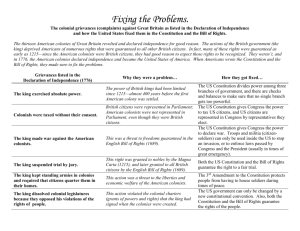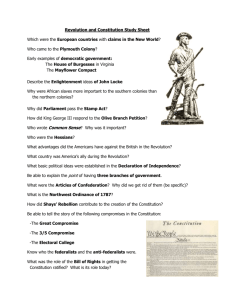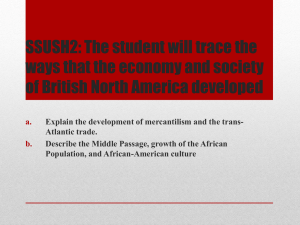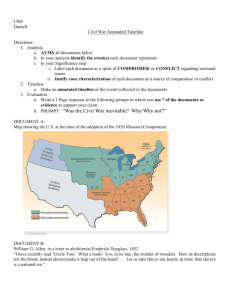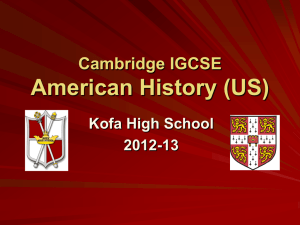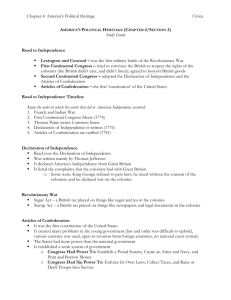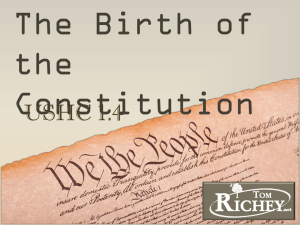IMPORTANT DEFINITIONS
advertisement
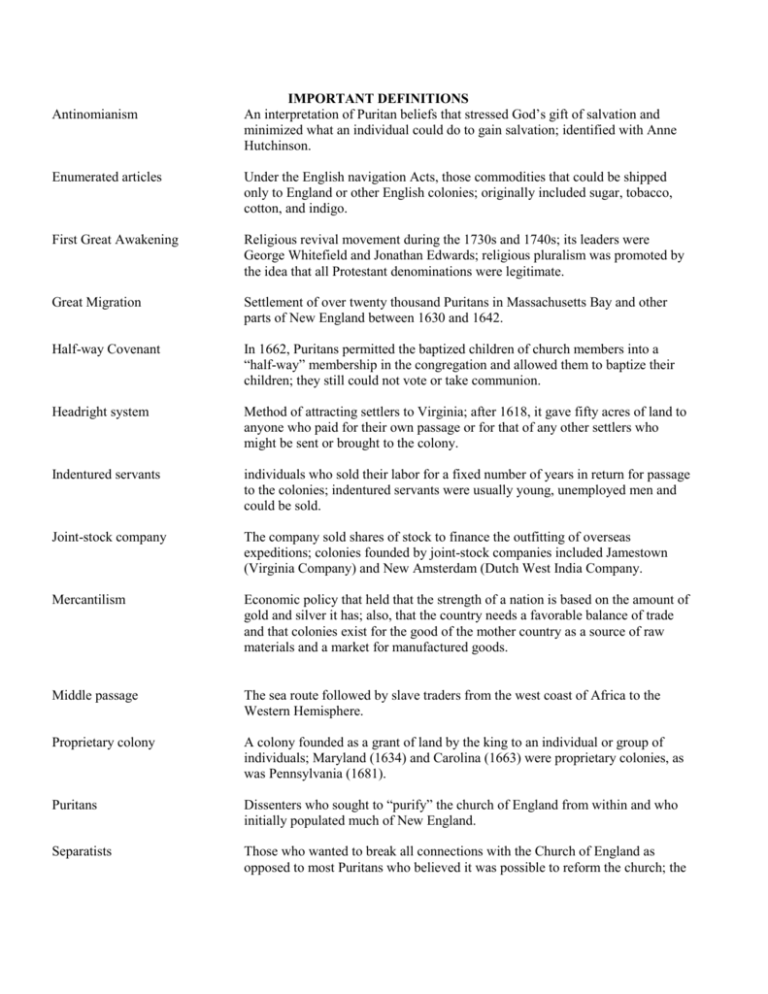
Antinomianism IMPORTANT DEFINITIONS An interpretation of Puritan beliefs that stressed God’s gift of salvation and minimized what an individual could do to gain salvation; identified with Anne Hutchinson. Enumerated articles Under the English navigation Acts, those commodities that could be shipped only to England or other English colonies; originally included sugar, tobacco, cotton, and indigo. First Great Awakening Religious revival movement during the 1730s and 1740s; its leaders were George Whitefield and Jonathan Edwards; religious pluralism was promoted by the idea that all Protestant denominations were legitimate. Great Migration Settlement of over twenty thousand Puritans in Massachusetts Bay and other parts of New England between 1630 and 1642. Half-way Covenant In 1662, Puritans permitted the baptized children of church members into a “half-way” membership in the congregation and allowed them to baptize their children; they still could not vote or take communion. Headright system Method of attracting settlers to Virginia; after 1618, it gave fifty acres of land to anyone who paid for their own passage or for that of any other settlers who might be sent or brought to the colony. Indentured servants individuals who sold their labor for a fixed number of years in return for passage to the colonies; indentured servants were usually young, unemployed men and could be sold. Joint-stock company The company sold shares of stock to finance the outfitting of overseas expeditions; colonies founded by joint-stock companies included Jamestown (Virginia Company) and New Amsterdam (Dutch West India Company. Mercantilism Economic policy that held that the strength of a nation is based on the amount of gold and silver it has; also, that the country needs a favorable balance of trade and that colonies exist for the good of the mother country as a source of raw materials and a market for manufactured goods. Middle passage The sea route followed by slave traders from the west coast of Africa to the Western Hemisphere. Proprietary colony A colony founded as a grant of land by the king to an individual or group of individuals; Maryland (1634) and Carolina (1663) were proprietary colonies, as was Pennsylvania (1681). Puritans Dissenters who sought to “purify” the church of England from within and who initially populated much of New England. Separatists Those who wanted to break all connections with the Church of England as opposed to most Puritans who believed it was possible to reform the church; the Pilgrims were Separatists. Triangular trade Trade pattern that developed in the colonies; New England shipped rum to the west coast of Africa in exchange for slaves that were sent to the West Indies for molasses that was sold in New England. Committees of Correspondence First established in Boston in 1772, the committees became a way for the colonies to state and communicate their grievances against Great Britain. Critical Period Term used by historians to describe the United States under the Articles of Confederation. Direct tax British-imposed tax directly on the colonies that was intended to raise revenue; the Stamp act was the first attempt by Parliament to impose a direct tax on the colonies. Enlightenment A European intellectual movement that stressed the use of human reason. Indirect tax A measure that raised revenue through the regulation of trade--the Sugar Act, for example. Loyalists Also known as Tories, the term refers to those Americans who remained loyal to Great Britain during the Revolution. Natural rights Those rights that the Enlightenment (and Jefferson’s Declaration) saw as inherent for all humans and that government is not justified in violating. Non-importation agreements A form of protest against British policies; colonial merchants refused to import British goods. Virtual representation The British argument that the American colonies were represented in Parliament, since the members of Parliament represented all Englishmen in the empire. Whig ideology Idea that concentrated power leads to corruption and tyranny; emphasis on balanced government where legislatures check the power of the executive. Writs of Assistance General search warrants employed by Britain in an effort to prevent smuggling in the American colonies. “No taxation without representation” The assertion that Great Britain had no right to tax the American colonies as long as they did not have their own representatives in the British Parliament. Antifederalists Opposed to a strong central government; saw undemocratic tendencies in the Constitution and insisted on the inclusion of the Bill of Rights. Included Thomas Jefferson, James Monroe, and Patrick Henry. Checks and Balances System embodied in the Constitution through which the power of each branch of government is limited by the other; the President’s authority to veto legislation and Congress’s power to override that veto are examples. Compact theory The idea advanced by Rousseau, Locke, and Jefferson, that government is created by voluntary agreement among the people involved and that revolution is justified if government breaks the compact by exceeding its authority. Confederation A political system in which the central government is relatively weak and member states retain considerable sovereignty. Enumerated powers Powers specifically given to Congress in the Constitution; including the power to collect taxes, coin money, regulate foreign and interstate commerce, and declare war. Factions Political groups that agree on objectives and policies; the origins of political parties. Loose construction Constitution is broadly interpreted, recognizing that it could not possibly anticipate all future developments; relies on the idea of implied powers and the “necessary and proper” clause. Both views on how to interpret the Constitution came up during the debate on chartering the Bank of the United States in 1791. Separation of powers The structure of the government provided for in the Constitution where authority is divided between the executive, legislative, and judicial branches; idea comes from Montesquieu’s Spirit of the Laws. States rights According to the compact theory of the Union the states retained all powers not specifically delegated to the central government by the Constitution. Strict construction The principle that the national government is legally granted only those powers specifically delegated in the Constitution Tariff A tax on imports (also referred to a “duty), taxes on exports are banned by the Constitution. A “protective” tariff has rates high enough to discourage imports. American System Economic program advanced by Henry Clay that included support for a national bank, high tariffs, and internal improvements; emphasized strong role for federal government in the economy. Corrupt bargain Refers to the claim from the supporters of Andrew Jackson that John Quincy Adams and Henry Clay had worked out a deal to ensure that Adams was elected President by the House of Representatives in 1824. Embargo An attempt to withhold good from export in order to influence the policies of the former purchasers. Era of Good Feelings Refers to the period after the War of 1812 during the presidency of James Monroe, when competition among political parties was at a low ebb. Impressment British practice of taking American sailors from American ships and forcing them into the British navy; a factor in the War of 1812. Internal improvements Included roads, canals, railroads; essentially, an internal transportation network that would bind the country together. Judicial review The right of the Supreme Court to declare a law passed by Congress unconstitutional; the principle was established in Marbury v. Madison, but was original sketched out in Hamilton’s essay #78 in The Federalist Papers. Kitchen cabinet Informal group of friends who advised Jackson during his administration. Jackson believed that the “official” Cabinet’s main function was to carry out his orders. Missouri Compromise Compromise worked out by Henry Clay in 1820: slavery would be prohibited in the o Louisiana territory north of 36 30'; Missouri would enter the Union as a slave state, Maine would enter the Union as a free state. Monroe Doctrine a United States policy that sought to insulate the Western Hemisphere from European intervention. Nullification The theory advanced by John Calhoun in response to the Tariff of 1828 (the Tariff of Abominations); states, acting through a popular convention, could declare a law passed by Congress “null and void”; the roots of the idea go back to Jefferson and Madison’s compact theory of government and are originally spelled out in the Kentucky and Virginia Resolutions. Pet banks A term used by Jackson’s opponents to describe the state banks that the federal government used for new revenue deposits in an attempt to destroythe Second Bank of the United States; the practice continued after the charter for the Second Bank expired in 1836. Spoils system Essentially, political patronage; public offices went to political supporters during Jackson’s presidency. War Hawks Those nationalist members of Congress who strongly supported war with Great Britain on the eve of the War of 1812; included Henry Clay and John C. Calhoun. Whig Party A national political coalition formed to oppose the Jacksonian Democrats. Abolition A moral crusade to immediately end the system of human slavery in the United States. Civil disobedience Intentionally breaking or defying the law to call attention to what is believed to be evil or injustice. Freeport Doctrine The position on slavery taken by Stephen Douglas during the debates with Lincoln in 1858. Slavery could not exist if local legislation did not accept it. Douglas refused to say whether he believed slavery was right or wrong. Kansas-Nebraska Act (1854) Created two new territories with slavery decided by popular sovereignty; it effectively repealed the Missouri Compromise as it applied to slavery north of the Compromise line. Nativism Response to the increased immigration in the 1840s, it reflected a fear that the United States was being taken over by foreigners. Nativism found a political expression in the American party, also known as the Know-Nothing party, which was founded in 1854 on a program of controlling immigration and requiring a longer naturalization period; the party was strongly anti-Catholic. Popular sovereignty Proposed by Senator Lewis Cass, it meant that the decision to permit slavery in a territory was up to the territorial legislature; it was incorporated into the Compromise of 1850 for New Mexico and Utah territories. Romanticism An intellectual movement that stressed emotion, sentiment, and individualism. A reaction to rationalism and the classical revival. American expression of the Romantic movement that emphasized the limits of reason, individual freedom, and nature; best represented by Ralph Waldo Emerson and Henry David Thoreau, the author of Walden and Civil Disobedience. The virtual civil war that erupted in Kansas in 1856 between pro-slavery and free soilers as a consequence of the Kansas-Nebraska Act. Political slogan of the Democrats in the election of 1844, which claimed fifty-four degrees, forty minutes as the boundary of the Oregon territory claimed by the United States. The Treaty of 1846 with Great Britain set the boundary at the forty-ninth parallel. The idea surfaced after the Mexican War that Congress had the authority to ban slavery in the newly acquired territories. It was embodied in the Wilmot Proviso. The advocates of “free soil” formed their own political party in 1848, and Martin Van Buren was their candidate for President. Transcen-dentalism “Bleeding Kansas” “Fifty-four forty or fight” “Free soil” Black codes Passed by state legislatures in 1865-1866; granted former slaves right to marry, sue, testify in court, and hold property but with significant qualifications. Border states Slave states--Delaware, Maryland, Kentucky, Missouri--that remained loyal to the Union; the secession of these states would have considerably strengthened the South. Carpetbaggers Derogatory term for Northern Republicans who were involved in Southern politics during Radical Reconstruction. Compromise of 1877 Rutherford B. Hayes and other Republicans agreed that U. S. Troops would be withdrawn from the South, agreed to appoint a Southerner to the Cabinet, and pledged federal projects to the South in return for an end to Democratic opposition to official counting of the electoral votes for the disputed election of 1876. Copperheads Northern Democrats, also known as Peace Democrats, who opposed Lincoln’s war policies and were concerned with the growth of presidential power. In the election of 1864, General George McClellan was nominated by the Democrats with their support. Draft riots Mob violence opposing conscription laws during the Civil War; the most violent occurred in New York City (July 1863). Ex Parte Milligan (1866) Supreme Court decision involving presidential war powers; civilians could not be tried in military courts in wartime when the federal courts were functioning. Freedmen’s Bureau Agency created by Congress as the war ended to assist Civil War refugees and freed former slaves. Ironclads Wooden ships with metal armor that were employed by both sides during the Civil War. Presidential Reconstruction Put forward by Andrew Johnson, it included repeal of ordinances of secession, repudiation of Confederate debts, and ratification of the Thirteenth Amendment. By the end of 1865, only Texas had failed to meet these terms. Radical Reconstruction Provided for dividing states into military districts with military commanders to oversee voter registration that included adult African-American males for state conventions; state conventions to draft constitutions that provided for suffrage for black men; state legislatures to ratify the Fourteenth Amendment. Scalawags Term used to describe Southern white Republicans who had opposed secession. Sharecropping Common form of farming for freed slaves in the South; received a small plot of land, seed, fertilizer, tools from the landlord who decided what and how much should be planted; landlord usually took half of the harvest. “Ten-Percent Plan” Lincoln’s Proclamation of Amnesty and Reconstruction (December 1863) provided that new state government could be established in the South when ten percent of the qualified voters in 1860 took an oath of loyalty. Atlanta Compromise Argument put forward by Booker T. Washington that African-Americans should not focus on civil rights or social equality but concentrate on economic self-improvement. Agrarian malaise Discontent among farmers, resulting from changes in their economic position after the Civil War. They sought help from states and the federal government, thus abandoning the doctrine of laissez-faire. Closed shop A factory or place of business that employs only union members. Craft unions Labor organizations whose members were skilled workers in a particular craft--for example, carpenters, masons, or cigar makers. The American Federation of Labor was composed of individual craft unions. Dawes Act (1887) Changed the reservation system by granting 160 acres and U. S. Citizenship to native American heads of families who agreed to give up their tribal allegiance. Gilded Age The name applied to the 1870s and 1880s during which national politics was characterized by party rivalries, the spoils system, and unregulated business competition. The term comes from the title of a novel written by mark Twain and Charles Dudley Warner. Jim Crow laws Laws that enforced segregation by discriminating against and suppressing black people. Long vs. short haul The railroad practice to charge higher rates on lines where there was no competition than on routes where several lines were operating. This often meant that the cost of shipping goods a short distance was greater than over a long distance. Mugwumps Reform Republicans who refused to support James Blaine, the party’s candidate in the election of 1884. Political machine A vote-gathering organization of politicians who loyally support a party boss and get the votes in their neighborhoods to support their party’s candidates by fulfilling needs and providing services to constituents. Social Gospel Religious response to the problems created by industrialization and urbanization in the late nineteenth century; supporters of the Social Gospel supported child labor laws, civil service reform, and control of the trusts. Stalwarts and HalfBreeds Factions in the Republican party that emerged by 1880; the Stalwarts, led by Senator Roscoe Conkling, supported the spoils system, while the Half-Breeds claimed to represent the idea of civil service reform. Trust A form of business organization in which a group of corporations in the same industry gave their stock in the individual companies to a board of trustees in return for stock certificates that earned dividends. The trust effectively eliminated competition by giving control to the board. The earliest example is the Standard Oil trust that controlled ninety percent of the oil refineries and pipelines. Turner Thesis The historian Frederick Jackson Turner argued that the frontier was the key factor in the development of American democracy and institutions; he maintained that the frontier served as a “safety valve” during periods of economic crisis. “Crime of ‘73" Through the Coinage Act of 1873, the United States ended the minting of silver dollars and placed the country on the gold standard. This was attacked by those who supported an inflationary monetary policy, particularly farmers, and believed in the unlimited coinage of silver. “Rum, Romanism, and Rebellion” An insult made against New York Irish-Americans by a Republican clergyman in the 1884 election; Republican candidate James Blaine’s failure to repudiate this statement lost him New York and contributed to his defeat by Grover Cleveland. Anarchist One who believes in a government without law or order, or in a government that lacks a central authority. Dollar Diplomacy President Taft’s policy of promoting U. S. Interests overseas by encouraging American business to invest in foreign countries, particularly in the Caribbean and Central America. Feminism A movement or doctrine that advocates or demands for women the same rights granted men, such as equal economic or political status. Ghetto A section of a city occupied by members of a minority group who live there because of economic or social pressure. Insular Cases The Supreme Court cases (1901-1903) that dealt with the constitutional rights in the newly acquired overseas territories. The Court ruled that the Constitution did not necessarily follow the flag, and therefore Congress was to determine how to administer the territories. Irreconcilables Senators opposed to ratification of the Treaty of Versailles on any grounds; lead by isolationists William Borah, Hiram Johnson, and Robert La Follette. Isolationism A foreign policy that abstains from political or economic alliances or compacts with other nations. Muckrakers A group of investigative reporters who pointed out the abuses of big business and the corruption of urban politics; included Frank Norris (The Octopus), Ida Tarbell (A History of the Standard Oil Company), Lincoln Steffens (The Shame of the Cities), and Upton Sinclair (The Jungle). New Nationalism Program that Theodore Roosevelt ran on in the election of 1912; large corporations had to be controlled and regulated by a strong President and the federal government that would protect the rights of women, labor, and children. New Freedom Woodrow Wilson’s program put forward during the election of 1912; business competition could be restored by breaking up the trusts, but Wilson did not believe in having the federal government control the economy. Poll tax A payment required for voting in some states, used as a tactic to keep blacks and poor whites from exercising their right to vote. Red Scare Heightened concern, after World War 1, in the United States about communism and fear that it would spread. Especially after the passage of the Espionage Act of 1917, the Sabotage Act of 1918, and the Sedition Act of 1918. Referendum, recall, direct primary Ways in which the Progressives hoped to bring about direct democracy; referendumgives the voters the right to accept or reject a piece of legislation; recall is a mechanism for removing an officeholder before the end of his or her term; direct primary allows the voters rather than the political bosses to nominate a party’s candidate for office. Reservationists Members of the Senate who were ready to ratify the Treaty of Versailles with modifications; the group is often divided into the “mild” Reservationists, who wanted only minor changes, and the “strong” Reservationists, who favored the significant changes advocated by Henry Cabot Lodge. Sacco and Vanzetti Refers to the trial of two Italian immigrants--Nicola Sacco and Bartolomeo Vanzetti, both confessed anarchists, for murder in 1920. Both men were found guilty and died in the electric chair in 1923, though their trial was a showcase for American bigotry and the evidence was scarce and improperly used. The New Manifest Destiny The late-nineteenth-century believed that it was the destiny of the United States to expand beyond its continental borders. The Big Four Refers to the allied leaders at the Paris Peace Conference: Wilson (United States), Georges Clemenceau (France), David Lloyd George (Great Britain), Vittorio Orlando (Italy). 100 days Period from March to June 1933 when Congress passed major legislation submitted by Roosevelt to deal with the Depression. Bonus Army Unemployed World War 1 veterans who came to Washington in the spring of 1932 to demand the immediate payment of the bonus congress had voted them in 1922. The veterans were forcibly removed from Anacostia Flats by federal troops under the command of Douglas MacArthur. Court packing proposal In the wake of Supreme Court decisions that declared key pieces of New Deal legislation unconstitutional, Roosevelt proposed increasing the number of justices. If a justice did not retire at age seventy, the President could appoint an additional justice up to a maximum of six. Deficit spending The English economist John Maynard Keynes proposed that governments cut taxes and increase spending in order to stimulate investment and consumption. The effect was to increase the deficit because more money was spent than was taken in. Deflation A reduction in available currency and credit that results in a decrease in the general price level. Hoovervilles Shanty towns that the unemployed built in the cities during the early years of the Depression; the name given to them shows that the people blamed Hoover directly for the Depression. Lost Generation Term coined by Gertrude Stein to describe American expatriate writers of the 1920s; include T. S. Eliot, F. Scott Fitzgerald, Ernest Hemingway, and Stein herself. Recession A moderate and temporary decline in the economy. Roaring Twenties Popular image of the decade as a period of prosperity, optimism, and changing morals; symbolized best by the “flapper.” Sick Chicken Case In Schechter Poultry v. U. S., the Supreme court struck down the National Industrial Recovery Act as unconstitutional. The decision encouraged Roosevelt to consider ways to change the makeup of the court. Subsidy Monetary assistance by a government to a person, group, or commercial enterprise. Welfare state A social system whereby the state assumes primary responsibility for the economic and social well-being of its citizens. “Return to Normalcy” Campaign theme of Warren Harding during the election of 1920; it reflected the conservative mood of the country after the constant appeals to idealism that characterized both the Progressive Era and Wilson’s fight over the League of Nations. “Share the Wealth” Program of Huey Long that proposed the redistribution of income of the rich to give every American a guaranteed annual income of $2,000 to $3,000, old-age pensions, money for a college education, and veterans benefits. blitzkrieg German term meaning “lightning war”; term applied to the rapid German military advance into Poland, Denmark, Norway, Belgium, Netherlands, and France in 1939 and 1940. Bracero Program Wartime agreement between the United States and Mexico to import farm workers to meet a perceived manpower shortage; the agreement was in effect from 1941 to 1947. Cash and carry Key provisions of the Neutrality act of 1939 that allowed the United States to sell arms and other contraband as long as nations paid cash and shipped the goods on their own vessels. Europe First Military strategy adopted by the United States that required concentrating on the defeat of Germany while maintaining a holding action against Japan in the Pacific. Final Solution Plan for the extermination of the Jewish population in Nazi-occupied Europe; a total of six million Jews were killed in death camps such as those established at Auschwitz, Belzec, Majdanek, Sobibor, and Treblinka. Internment Detaining enemy aliens during wartime; term specifically applied to Japanese aliens and Japanese-Americans living on the West Coast (and elsewhere in the U. S.) Who were sent to relocation centers (Manzanar, Topaz, etc.) In 1942 allegedly because of possible disloyalty. Kamikaze Literally “divine wind,” Japanese term for fighter pilots who crashed their planes into American warships during the latter stages of World War 2. Merchants of death Term used by Senator Gerald P. Nye to describe the munitions-makers whom he blamed for forcing the United States into World War 1. Nye headed a committee that investigated the industry from 1934 to 1936. Rosie the Riveter Term that cam to symbolize all women who worked in defense plants and other industries during World War 2. Second front British and American invasion of France to relieve pressure on the Soviet Union in the east; Stalin had insisted on opening the second front from June 1941, but the invasion of Normandy (Operation Overlord) did not take place until June 1944. Sphere of influence An area in which a nation seeks to be dominant by securing preferential treatment of a political, economic, and/or social nature. Victory gardens Plots of land set aside by Americans during World Ward 1 and 2 for the cultivation of vegetables so as to limit the purchase of produce in stores. Brinksmanship The policy associated with Secretary of State John Foster Dulles that stressed that Soviet aggression would be met by massive nuclear retaliation; Dulles was opposed to simply “containing” the USSR and wanted to liberate the countries under Soviet control. Containment American foreign policy adopted after World War 2 to restrain the expansion of the Soviet Union. It was based on the belief that the USSR does not take risks and would back down if faced with determined opposition. The policy was developed by Foreign Service officer George Kennan in 1947. Detente Policy toward the USSR developed by President Nixon and Henry Kissinger focused on easing tensions through negotiations, particularly on arms reductions--for example, the first Strategic Arms Limitation Treaty (SALT) in 1972. Eisenhower Doctrine The United States was prepared to use force in the Middle East against aggression from any country controlled by the Soviet Union (1957). Military-industrial complex In his farewell address in 1961, Eisenhower warned of the danger posed by a strong defense industry and the armed forces; despite his own background, Eisenhower wanted to control military spending. Shuttle diplomacy Henry Kissinger’s diplomatic efforts in the Middle East in early 1974 led to the withdrawal of Israeli troops from the west bank of the Suez Canal and disengagement between Israel and Syria on the Golan Heights. Summit diplomacy Meetings between world leaders, usually the United States and the Soviet Union, to discuss bilateral issues and matters of mutual concern--for example, nuclear disarmament; the first summit conference took place in 1944 in Geneva. Truman Doctrine In response to the Greek Civil War in 1947, the United States provided economic and military aid to both Greece and Turkey. The United States would support “free peoples” against armed minorities or outside pressure. Vietnamization President Nixon’s policy of withdrawing troops from Vietnam and turning the fighting over to the South Vietnamese with massive amounts of American supplies. Baby boom The significant increase in the birth rate from 1946 through 1957; the rise in population contributed to the growth of the suburbs, consumer culture, and the sharp increase in college enrollments in the 1960s. Dixiecrats Southern Democrats who bolted the party following the adoption of a civil rights plank at the 1948 convention; ran Strom Thurmond as their candidate in 1948 as the States’ Rights party. Fair Deal President Truman’s domestic policy (1948) that included civil rights and an extension and enlargement of the New Deal--health insurance, federal aid to education, public housing, and repeal of the Taft-Hartley Act. Great Society President Johnson’s domestic program that included Medicare, civil rights legislation, the War on Poverty; funding for the programs suffered because of the costs of the Vietnam War. Modern Republicanism Represented by President Eisenhower, it combined acceptance of the basic features of the New Deal with a conservative economic policy, particularly controlling government spending. New Federalism President Nixon’s program to return power and tax dollars to the states and cities; the key aspect was revenue sharing, which distributed $30 billion in revenues to the states. Stagflation High inflation combined with high unemployment and a declining gross national product; used to describe economic condition of the country in the mid-1970s. Supply-side economics President Reagan’s economic policy; reduction in taxes would give people more spendable income and in turn lead to business expansion and more jobs. The policy did increase the federal deficit. Warren Court Under Chief Justice Earl Warren (1953-1969), an activist Supreme Court became an important instrument of social and political change, particularly in the areas of civil rights and civil liberties. Downloaded with permission from AP List Serve message 3/27/2011



